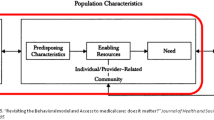Abstract
Down syndrome (DS) is a relatively common chromosomal condition, which can be diagnosed prenatally. However, little is known about the diagnosis of the condition in developing countries. This qualitative study explored parents’ experiences of the diagnosis of DS in Pakistan. Fifteen mothers and fifteen fathers of children with DS had semi-structured interviews, which were analysed using thematic analysis. All the parents received their child’s diagnosis after birth, ranging from the postnatal period to 7 years of age. Parents recalled receiving little or no information at the time of diagnosis, leading to misunderstandings about the cause and nature of their child’s condition. Some parents referred to their child being “Mongol” and were unaware of “Down syndrome” as the more appropriate term for the condition. Use of such terms for DS restricted parents’ ability to source further information about the condition. Many parents showed poor understanding of the aetiology and prognosis of the condition. Improved training for healthcare professionals in recognising key features of DS in the neonatal period or in early childhood could enable earlier diagnosis of the condition. In addition, provision of accurate information in a sensitive manner following diagnosis could enable parents to optimise their child’s well-being.
Similar content being viewed by others
References
Ahmed S, Ld B, Ahmed M, Jafri H, Raashid Y (2013) Experiences of parents with a child with Down syndrome in Pakistan and their views on termination of pregnancy. J Community Genet 4:107–114
Berg JM, Gilderdale S, Way J (1969) On telling parents of a diagnosis of mongolism. Br J Psychiatry 115:1195-1196
Bourke E, Snow P, Herlihy A, Amor D, Metcalfe S (2013) A qualitative exploration of mothers’ and fathers’ experiences of having a child with Klinefelter syndrome and the process of reaching this diagnosis. Eur J Hum Genet
Braun V, Clarke V (2006) Using thematic analysis in psychology. Qual Res Psychol 3:77–101
Choi EK, Lee YJ, Yoo IY (2011) Factors associated with emotional response of parents at the time of diagnosis of Down syndrome. J Spec Pediatr Nurs 16:113–120
Conway MA, Anderson SJ, Larsen SF, Donnelly CM, McDaniel MA, McClelland AG, Rawles RE, Logie RH (1994) The formation of flashbulb memories. Mem Cognit 22:326–343
Cunningham CC, Sloper T (1977) Parents of Down's syndrome babies: their early needs. Child Care Health Dev 3:325–347
Devlin L, Morrison PJ (2004) Accuracy of the clinical diagnosis of Down syndrome. Ulster Med J 73:4–12
Ekelund CK, Jorgensen FS, Petersen OB, Sundberg K, Tabor A (2008) Impact of a new national screening policy for Down's syndrome in Denmark: population based cohort study. BMJ 337:a2547
Ferguson JE, Kleinert HL, Lunney CA, Campbell LR (2006) Resident physicians' competencies and attitudes in delivering a postnatal diagnosis of Down syndrome. Obstet Gynecol 108:898–905
Finkenauer C, Luminet O, Gisle L, El-Ahmadi A, Van Der Linden M, Philippot P (1998) Flashbulb memories and the underlying mechanisms of their formation: toward an emotional-integrative model. Mem Cognit 26:516–531
Government Of Pakistan (2009) Pakistan Demographic Survey 2007
Gustavson K (2005) Prevalence and aetiology of congenital birth defects, infant mortality and mental retardation in Lahore, Pakistan: a prospective cohort study. Acta Paediatr 94:769–774
Hines S, Bennett F (1996) Effectiveness of early intervention for children with Down syndrome. Ment Retard Dev Disabil Res Rev 2:96–101
Jafri H, Ahmed S, Ahmed M, Hewison J, Raashid Y, Sheridan E (2012) Islam and termination of pregnancy for genetic conditions in Pakistan: implications for Pakistani health care providers. Prenat Diagn 32:1218–1220
Lenhard W, Breitenbach E, Ebert H, Schindelhauer-Deutscher H, Henn W (2005) Psychological benefit of diagnostic certainty for mothers of children with disabilities: lessons from Down syndrome. Am J Med Genet A 133a:170–175
Majnemer A (1998) Benefits of early intervention for children with developmental disabilities. Semin Pediatr Neurol 5:62–69
Malik A A (2011) Health care provider motivation: perceptions, determinants and measurements among physicians in Lahore, Pakistan. in http://Archiv.Ub.Uni-Heidelberg.De/Volltextserver/12849/. Accessed 07.03.14
National Screening Committee (2007) Antenatal screening - working standards for Down’s syndrome screening. in: http://Fetalanomaly.Screening.Nhs.Uk/Getdata.Php?Id=11304. Accessed 29.11.13
Nishtar S (2006) Heartfile’s contribution to health systems strengthening in Pakistan. East Mediterr Health J 12:38–53
Poehlmann J, Clements M, Abbeduto L, Farsad V (2005) Family experiences associated with a child’s diagnosis of fragile X or Down syndrome: evidence for disruption and resilience. Ment Retard 43:255–267
Rahman S, Obaid-Ur-Rahman M (2005) Prevalence rate of Down’s syndrome in Karachi resident women. Pak J Pharm Sci 18:61–63
Skotko B, Bedia RC (2005) Postnatal support for mothers of children with Down syndrome. Ment Retard 43:196–212
Skotko BG (2005) Prenatally diagnosed Down syndrome: mothers who continued their pregnancies evaluate their health care providers. Am J Obstet Gynecol 192:670–677
Skotko B, Kishnani P, Capone G (2009) Prenatal diagnosis of Down syndrome: how best to deliver the news. Am J Med Genet A 149a:2361–2367
Acknowledgments
We thank all the participants for their generosity in agreeing to take part in this study and sharing their experiences. We also thank Professor Allan House, Dr Carol Chu and Dr S Yasmeen Shah for supporting this study.
Conflict of interest
Kiran Jan Ahmed, Mushtaq Ahmed, Hussain Jafri, Yasmin Raashid and Shenaz Ahmed declare that they have no conflict of interest.
Compliance with ethics guidelines
All procedures followed were in accordance with the ethical standards of the responsible committee on human experimentation (University of Leeds Ethics Committee) and with the Helsinki Declaration of 1975, as revised in 2000 (5). Informed consent was obtained from all patients for being included in the study.
Author information
Authors and Affiliations
Corresponding author
Rights and permissions
About this article
Cite this article
Ahmed, K.J., Ahmed, M., Jafri, H.S. et al. Pakistani mothers’ and fathers’ experiences and understandings of the diagnosis of Down syndrome for their child. J Community Genet 6, 47–53 (2015). https://doi.org/10.1007/s12687-014-0200-6
Received:
Accepted:
Published:
Issue Date:
DOI: https://doi.org/10.1007/s12687-014-0200-6




